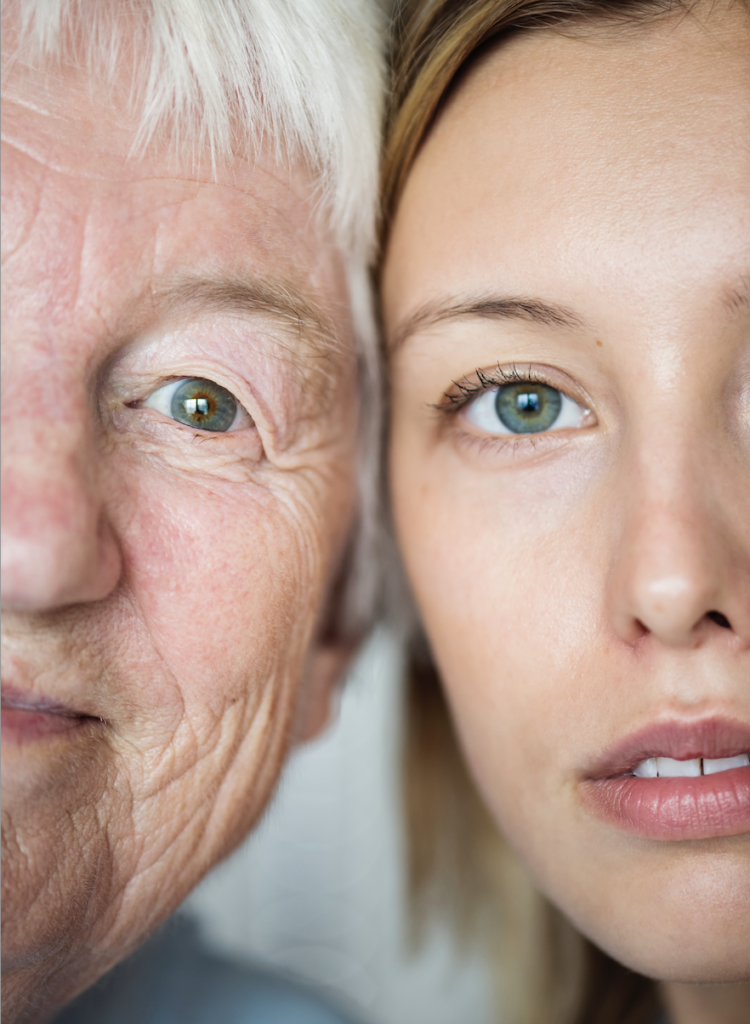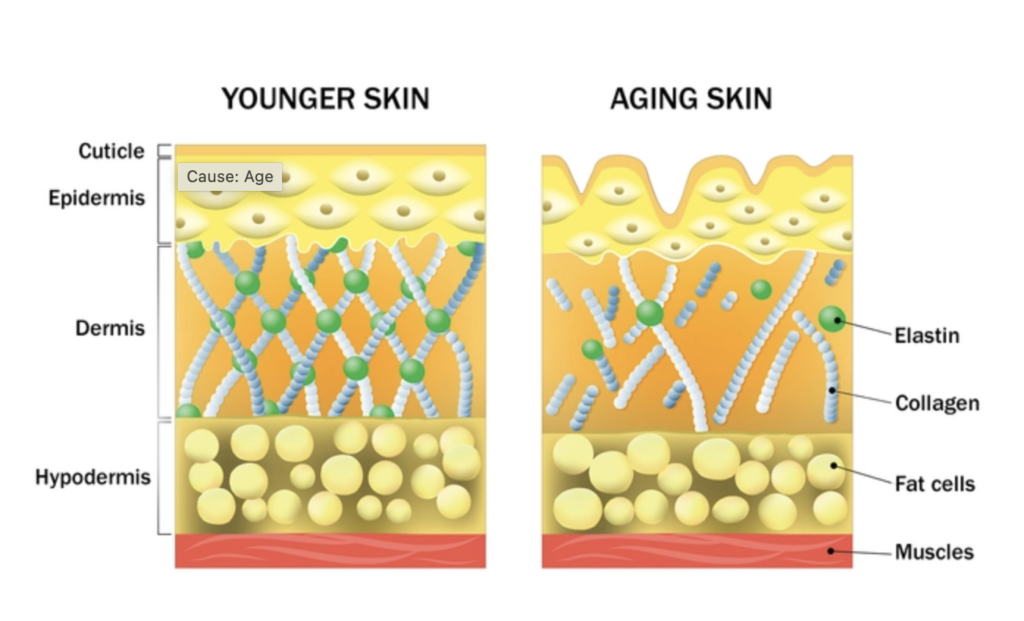
Although you might think wrinkles are just inherited, there are two additional contributors to the changes within our skin as we age.
Intrinsic aging is part of our natural aging process:
- After age 20 our bodies produce 1% less collagen each year, so our skin becomes thicker and looser. When it is stretched back and forth repeatedly it eventually turns into wrinkles.
- In our 30s our fat cells start to shrink, which eventually causes the skin to become thin and brittle. This results in a reduction in sebum production, which is why we see wrinkles around our eyes first as this area has no sebaceous glands.
- After the age of 40 collagen production decreases significantly but doesn’t completely stop stops altogether, and it becomes difficult for the cells to regenerate.
- Finally, after 50, we lose the fat stored in the subcutaneous layer, and there is a decline in blood vessels and circulation. This results in a reduced supply of nutrition and causes our skin to become thinner.
Extrinsic aging relates to exterior environmental factors:
- Repeated facial expressions – whether happy or sad – eventually lead to creases in our skin, appearing in the opposite direction to how our facial muscles contract.
- Smoking (the repeated action of sucking on a cigarette) has the same effect as repeated facial expressions. The nicotine found in cigarettes also narrows the blood cells in the epidermis, depriving the skin of oxygen and nutrients, which can result in sagging skin and wrinkles.
- Free radicals in polluted air alter the chemical construction of our skin, speeding up the aging process so wrinkles appear earlier.
- Sun exposure-Too much ultraviolet (UV) light from the sun can damage collagen in your skin. This causes your body to produce too much abnormal elastin. If this happens over and over, your skin may start to thicken. It will develop a rough feel with deep wrinkles and varied color (age spots).

It’s natural to wrinkle more as you age. Skin cells divide more slowly, and the inner layer of skin (the dermis) thins. Proteins in your skin start to break down. This includes collagen, which supports its outer structure, and elastin, which makes it stretchy.
Skin aging involves many other factors and mechanisms not mentioned here, such as changes in skin cell turnover rates, alterations in the extracellular matrix, and hormonal influences [2][6].
What type of treatments can help increase collagen production in the skin?
- Microneedling: This procedure uses tiny needles to create micro-injuries in the skin, stimulating collagen production as part of the healing process. It’s also known as collagen induction therapy[12][13].
- Radiofrequency (RF) treatments: Devices like Morpheus8 use RF energy to heat the deeper layers of skin, promoting collagen production. This can help tighten skin and improve texture[13].
- Laser treatments: Certain laser therapies, like Fraxel or CO2 lasers, can stimulate collagen production. The Icon™ 1540 laser treatment is specifically mentioned as effective for this purpose[16].
- LED light therapy: Red and infrared light have been shown to stimulate collagen production. Treatments like LIGHTWAVE LED Therapy can be effective[16].
- Chemical peels: These treatments remove the top layer of skin, prompting increased collagen production as the skin heals.
- Topical retinoids: Prescription-strength retinoids like tretinoin, or over-the-counter retinol, can stimulate collagen production when used regularly[14].
- Ultherapy: This FDA-cleared treatment uses ultrasound energy to stimulate collagen production in the deep layers of the skin[12].
- Collagen-stimulating fillers: Injectables like Sculptra® Aesthetic gradually stimulate the body’s own collagen production[16].
- PDO thread lifts: This procedure uses dissolvable sutures to lift the skin and stimulate collagen production[13].
It’s important to note that the effectiveness of these treatments can vary depending on individual factors, and some may require multiple sessions for optimal results. Always consult with a qualified dermatologist or aesthetician to determine the best treatment for your specific needs and skin type.
Citations:
[1] https://www.medicalnewstoday.com/articles/317151
[2] https://pillser.com/supplements/vegan-collagen-builder-1989
[3] http://www.searchwellness.com/liquid-collagen-for-women-with-biotin-marine-collagen-elixir-pl?currency=USD&language=en
[4] https://heivy.com/es/products/heivy-4-in-1-liquid-collagen-peptides-health-and-beauty-support
[5] https://www.amazon.com/Collagen-NuBest-Promotes-Hydrolyzed-Capsules/dp/B06ZYRTD4T?psc=1&smid=A2509EVQU23VKV
[6] https://www.ecrater.com/p/45348640/visible-result-with-fuel-nutrition-glow?gps=1
[7] https://www.whatnot.com/listing/TGlzdGluZ05vZGU6MjY2MzU5NzY0
[8] https://www.spoiledchild.com/e27-extra-strength-liquid-collagen
[9] https://www.macys.com/shop/product/left-coast-performance-multi-collagen-protein-capsules-180ct?CAGPSPN=pla&ID=17815612&pla_country=US
[10] https://skintechnique.com/5-ways-to-boost-collagen/
[11] https://pureaestheticsgainesville.com/10-ways-to-increase-your-collagen-production-non-surgically/
[12] https://www.aptmedicalaesthetics.com/blog/best-collagen-stimulating-treatments-procedures/
[13] https://www.labeautyskincenter.com/blog/glow-up-with-these-five-aesthetic-treatments-that-boost-collagen-production
[14] https://www.allure.com/story/collagen-boosters-at-home
[15] https://www.uclahealth.org/news/article/should-you-take-collagen-supplements
[16] https://www.spaatspringridge.com/blog/what-are-the-best-procedures-to-produce-collagen/
Citations:
[1] https://biopelle.com/latest-blog-posts/intrinsic-aging-extrinsic-aging-skin/
[2] https://www.oaepublish.com/articles/2347-9264.2020.153
[3] https://platinumdermatology.com.au/article/extrinsic-vs-intrinsic-ageing-whats-the-difference/
[4] https://www.dermatologyofnorthtexas.com/aging-skin/
[5] https://www.estheticscenter.com/blog/intrinsicvsextrinsicaging
[6] https://www.ncbi.nlm.nih.gov/pmc/articles/PMC8824545/
[7] https://www.eastondermatology.com/blog/are-wrinkles-hereditary
[8] https://www.ncbi.nlm.nih.gov/pmc/articles/PMC6047276/
